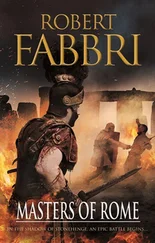Robert Fabbri - Rome's lost son
Здесь есть возможность читать онлайн «Robert Fabbri - Rome's lost son» весь текст электронной книги совершенно бесплатно (целиком полную версию без сокращений). В некоторых случаях можно слушать аудио, скачать через торрент в формате fb2 и присутствует краткое содержание. Год выпуска: 2015, ISBN: 2015, Издательство: Atlantic Books, Жанр: Исторические приключения, на английском языке. Описание произведения, (предисловие) а так же отзывы посетителей доступны на портале библиотеки ЛибКат.
- Название:Rome's lost son
- Автор:
- Издательство:Atlantic Books
- Жанр:
- Год:2015
- ISBN:9780857899668
- Рейтинг книги:5 / 5. Голосов: 1
-
Избранное:Добавить в избранное
- Отзывы:
-
Ваша оценка:
- 100
- 1
- 2
- 3
- 4
- 5
Rome's lost son: краткое содержание, описание и аннотация
Предлагаем к чтению аннотацию, описание, краткое содержание или предисловие (зависит от того, что написал сам автор книги «Rome's lost son»). Если вы не нашли необходимую информацию о книге — напишите в комментариях, мы постараемся отыскать её.
Rome's lost son — читать онлайн бесплатно полную книгу (весь текст) целиком
Ниже представлен текст книги, разбитый по страницам. Система сохранения места последней прочитанной страницы, позволяет с удобством читать онлайн бесплатно книгу «Rome's lost son», без необходимости каждый раз заново искать на чём Вы остановились. Поставьте закладку, и сможете в любой момент перейти на страницу, на которой закончили чтение.
Интервал:
Закладка:
‘Now, my dear, I’m going to open the door to all this squalor for my clients; they will greet me not only as the master of this squalor but also as the Consul of Rome who can do great favours for them and they will ignore the fact that I come from a Sabine family that can only boast one member of the Senate before me and my brother, just as they will ignore my rough Sabine accent. And then, having dealt out private patronage, I shall, as Consul of Rome, publicly deliver one of Rome’s greatest enemies to the Emperor for punishment. If you like, you and our daughter may come to watch, along with all the other women, and you can enjoy the false compliments that they give you. Or perhaps you’re too afraid to show your face because your husband bought you a wet nurse who belongs to a tribe that is so out of fashion that she cannot even produce decent milk.’
Vespasian turned and signalled to his doorkeeper to open up; it was with some relief that he heard the brisk clatter of Flavia’s retreating footsteps over the mewling of his youngest son.
Vespasian sat on his curule chair in front of the impluvium at the centre of the atrium; the gentle spatter of the fountain, issuing from a vase on Venus’ shoulder, remained constant as the dawn light grew, adding a steely tinge to the lifelike, painted skin tones of her naked torso basking in the oil lamps’ glow. Hormus stood behind him making notes on a wax tablet. To either side of him were posted the twelve lictors who would accompany him, as consul, everywhere in Rome, carrying the fasces, the axes bound with rods, as a symbol of his power to command and execute. However, it was not civic power that Vespasian was exercising now but, rather, personal power as the last and least important of his two hundred or so clients greeted him.
Vespasian nodded his acknowledgement to the man. ‘I have no use for you today, Balbus, you may return to your business once you have escorted me to the Forum.’
‘An honour, Consul.’ Balbus adjusted his plain white citizen’s toga and withdrew to one side.
‘How many waiting for a private interview, Hormus?’ Vespasian asked, looking around the room filled with respectful men talking in murmurs as they waited for their patron to leave the house.
Hormus had no need to consult his tablet. ‘Three that you asked to stay and then a further seven who requested an audience.’
Vespasian sighed; it would be a long morning. However, as the Senate was not due to sit that day it was one of the few occasions that he had the time to deal with personal business before his public duties would call him away; and it was with great interest that he was looking forward to his public duties.
‘And then there’s a man who is not your client asking for an interview as well.’
‘Really? What’s his name?’
‘Agarpetus.’
Vespasian was none the wiser.
‘He’s a client of the imperial freedman Narcissus.’
Vespasian raised his eyebrows. ‘A client of Narcissus’ here to see me? Is it a message or is he trying to ingratiate himself with me?’
‘He didn’t say, master.’
Vespasian digested this for a few moments before rising to his feet; formality dictated that he would have to see this man last, after his own clients, so it would be a while before his curiosity would be satisfied.
But first, business.
Followed by his slave, he walked with the slow dignity of the leading magistrate in Rome, past the men awaiting his favour, to the tablinum , the room curtained off at the far end of the atrium, and seated himself behind the desk. ‘I’ll deal with the three that I need favours from, first, Hormus; in order of precedence.’
‘What the Emperor did while he held the office of censor, four years ago, cannot be undone, Laelius,’ Vespasian said, having heard the final plea for favour from a balding citizen wearing a very finely woven crimson tunic under his plain white toga. A heavy gold chain glinted around his neck.
‘I understand that, patronus ; however, the situation has changed.’ Laelius produced a scroll from the fold of his toga and stepped up to the desk to hand it to Vespasian. ‘This is a receipt from the Cloelius Brothers’ banking business in the Forum Romanum. It is for exactly one hundred thousand denarii, the financial threshold for admittance to the equestrian order. When Claudius stripped me of equestrian rank four years ago he was perfectly right to do so as, owing to a series of unwise investments, my combined wealth in property and cash had fallen well below the limit. But now, thanks to your brother, at your behest, securing me the contract to supply chickpeas to the Danuvius Fleet, I’ve reversed my fortunes and am now financially eligible for readmittance.’
Vespasian glanced at the receipt; it was genuine. ‘The Emperor may not revise the rolls for a few years yet.’
Laelius wrung his hands; there was a hint of desperation in his voice. ‘My son is now seventeen; only as an eques can I hope to secure him a post as a military tribune and start him on the Cursus Honorum. In two or three years it’ll be too late.’
For all his client’s outward appearance of confidence Vespasian could perceive that Laelius was just another middle-aged man dogged by the spectre of impending old age with nothing to show for his life. But, if he could get his son started upon the succession of honours, the military and political career that could lead to a seat in the Senate, then he could justifiably claim to have done honour for his family by bettering it. Vespasian could understand his position well; it had been his parents’ ambition for their family that had driven Vespasian and his brother Sabinus to the highest office that a citizen could achieve — barring, of course, becoming emperor; that was the prerogative of one family alone. ‘Do I take it that there are two favours that you are asking me: firstly to use my influence with the imperial household to have Claudius enrol you in the equestrian order, and then to ask my brother to get your son a post as a military tribune in one of his two Moesian legions? Having already got him to award you the chickpea contract.’
Laelius winced and produced another scroll from his toga. ‘I know I ask a lot, patronus, but I give a lot in return. I know that senators are forbidden to conduct trade; however, I know of no reason why a senator should not benefit from trade that is conducted by someone else. This is a legal document that would make you a sleeping-partner in my business with an interest of ten per cent of the profits.’
Vespasian took the scroll, perused it and then handed it over his shoulder to Hormus standing behind him. ‘Very well, Laelius, if you make it twelve per cent I’ll see what I can do.’
‘Have Hormus make the alteration in the contract, patronus.’
‘It will be his pleasure.’
Laelius bowed his head repeatedly in thanks and gratitude while rubbing his hands and calling down the blessings of all the gods onto his patron as Hormus escorted him out through the curtains.
Vespasian took a few sips of watered wine while he waited for his final supplicant of the morning, contemplating, as he did, just what a client of Narcissus’ could want from him.
‘Tiberius Claudius Agarpetus,’ Hormus announced, showing in a clean-shaven, wiry man of evident wealth, judging by the heavily jewelled rings on each of his fingers and thumbs. He had the olive skin of the northern Greeks, which was stretched tight over his high-cheekboned, sharp-nosed face. Regardless of having two Roman names he disdained the toga, despite the formality of the occasion.
Vespasian did not offer him a seat. ‘What can I do for you, Agarpetus?’
‘It’s more about what I can do for you, Consul.’ The Greek spoke with a measured tone, his dark eyes never leaving Vespasian’s nor showing a hint of feeling.
Читать дальшеИнтервал:
Закладка:
Похожие книги на «Rome's lost son»
Представляем Вашему вниманию похожие книги на «Rome's lost son» списком для выбора. Мы отобрали схожую по названию и смыслу литературу в надежде предоставить читателям больше вариантов отыскать новые, интересные, ещё непрочитанные произведения.
Обсуждение, отзывы о книге «Rome's lost son» и просто собственные мнения читателей. Оставьте ваши комментарии, напишите, что Вы думаете о произведении, его смысле или главных героях. Укажите что конкретно понравилось, а что нет, и почему Вы так считаете.












